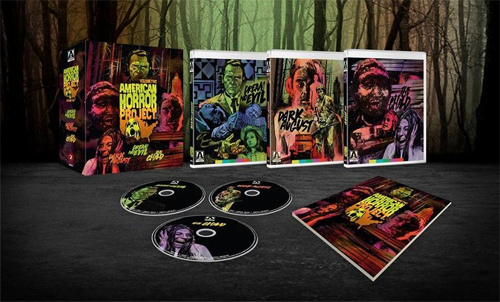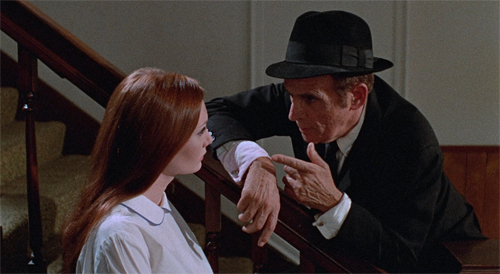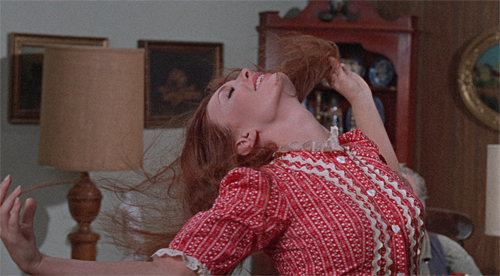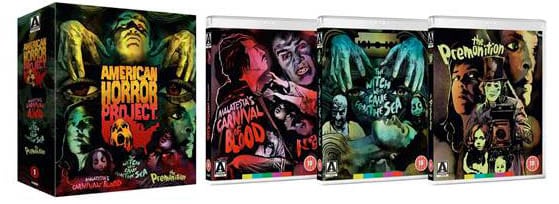Dream No Evil (1970)
Directed by: John Hayes
Written by: John Hayes
Starring: Brooke Mills, Edmond O'Brien, Michael Pataki, Paul Prokop

Part of the American Horror Project Vol2
Available on Blu-ray now from Arrow Films
Time for some more weird super ’70s stuff courtesy of Arrow’s American Horror Project, a series in which a variety of strange and obscure features have been curated for your viewing pleasure. In this instalment I’ll be covering the sinister fantasies of an orphaned girl with Dream No Evil. Perhaps not the most original idea ever to be put into a screenplay, but an adequate starting place for plenty of odd goings on. I suppose the inclusion of a travelling faith healer and a lot of bizarre moments along the way help. If only the rest of the plot wasn’t so very familiar, even before an intrusive narrator spells out every plot twist ahead of time…

Grace (Brooke Mills) is a troubled child in the opening which depicts her younger self having nightmares about her absent father failing to save her from unseen forces. Already the seeds for a psychological thriller are being planted. After an abrupt jump through an opening credits time warp we find her adoptive parents (only seen from the waist down) have been cut from the picture entirely, and she’s now living with her foster brother Jessie (Michael Pataki). He’s the reverend for a travelling faith healer show and Grace.. well she’s some kind of acrobat. I think? Your guess is as good as mine. There are a lot of strange scenes here, some that are plot relevant but most that aren’t.
Grace is engaged to Patrick, (Paul Prokop) a doctor at a city hospital. You might think that this is a great setup for a tried and tested faith versus science conflict, but instead Patrick is only here to let Grace down in the third act after he’s had an affair with medical student Shirley (Donna Anders). Perhaps there’s a little clue to this in an early scene where Patrick and Shirley live in the same house and he has to help her shower… but perhaps this movie has no idea how subterfuge works. For all the interesting and quirky moments the big problem here is that there’s no mystery, and you don’t have to have seen Psycho to know what’s about to happen.
As the narrator bluntly puts it barely half an hour into the film, Grace is about to turn fantasy into reality and enter an ‘imaginary world’. So when she takes a trip into town to search for her long lost daddy you can already tell where this is all heading. After visiting a bizarre retirement home where the elderly men are all seeing elderly prostitutes it becomes obvious that she’s day dreaming or at perhaps even living with some kind of psychosis. This becomes even more apparent when the man in charge of this business (Marc Lawrence) happens to be moonlighting as an undertaker who coincidentally has her father’s corpse fresh on the slab. It’s another odd moment but things get stranger when her dear pa comes back to life.

Is this all part of her faith healing powers or some sort of symbolic resurrection? That would have been pretty interesting, but since the narrator spoiled that for us from the outset there’s no such luck. Still, her father Timothy (Edmond O’Brien) is the best character in the film; a surly old musician who smokes a pipe and plays the accordion. Grace even does a rather energetic jig for Jessie and Timothy as he plays a tune, although Jessie is appropriately confused by the whole episode. After her father’s revival Grace takes the two of them for a week away at a rural farmhouse, but this is where reality really starts to crumble and things start to get even further out of hand.
It’s a suitable gaudy looking film as the tone shifts from melancholy loneliness to bloody nightmare, and Arrow’s restoration has a lot of crisp details that bring out the 1970s decor. One intimate moment between Patrick and Grace might be totally black because of the lighting, but otherwise it’s a moody piece of work. The eerie close-ups in the morgue and the cuts between Grace’s visions are particularly striking. If only there was any sense of mystery to the whole affair, something that’s made even more laughable when the local sheriff starts snooping around. There are even moments when it feels like they’ve just passed a commercial break and a voice over is needed to recap what’s going on.
All the interesting inclusions can’t distract from the problem of this being a very familiar tale being told without any tact. The inevitable affair subplot and the rushed conclusion compound this during the third act where there could have been way more suspense. There also could have been more depth to a story about a religious girl and a doctor being in love, but the whole idea remains untapped. Some of the deaths might be tame but they at least make the story more engaging, something that can’t always be said in the scenes before daddy arrives. It’s a moody and tragic film with plenty of potential, but without the writer exploring these themes further it can only ever be a mild recommendation.
Further Reading:
Bat reviews THE CHILD (1977)








Be the first to comment